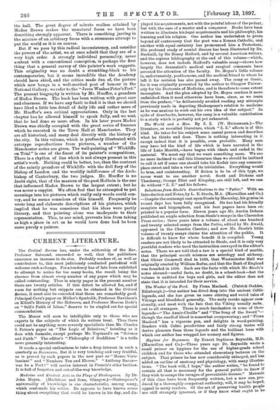Medicine and Kindred Arts in the Plays of Shakespeare. By
Dr. John Moyes. (Maclehose and Sons, Glasgow.)—Shakespeare's universality of knowledge is one characteristic, among many, which confounds his critics. He appears to have known some- thing about everything that could be known in his day, and dis.
played his acquirements, not with the painful labour of the pedant, but with the ease of a master and a conqueror. Books have been
written to illustrate hislegal acquirements and his philosophy, his. learning and his religion. One author has undertaken to prove, beyond all controversy that the poet was a Roman Catholic, anAl another with equal certainty has pronounced him a Protestant_ His profound study of mental disease has been illustrated by Dr.. Bucknill, by Sir Henry Salford, and by several American writers. and the copious bibliography at the end of this volume—which, however, does not include Halford's valuable essay—shows how largely the dramatist's medical and surgical comments have arrested the attention of the faculty. Dr. Moyes's little volume is, unfortunately, posthumous, and the medical friend to whom he left it for revision has also passed away. The essay or thesis, for it was originally presented by the author to Glasgow Univer- sity for the Doctorate of Medicine, and is therefore to some extent incomplete. And the plan adopted by Dr. Moyes renders it more unfinished than it need otherwise have been, since, as we learn from the preface, "he deliberately avoided reading any attempts previously made in depicting Shakespeare's relation to medicine as he wao anxious to work out his own idea, of the' subject." In spite of drawbacks, however, the essay is a valuable contribution to a study which is probably not yet exhausted.


































 Previous page
Previous page